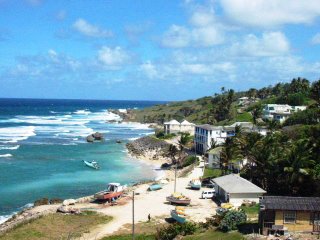 and create an example for developing communities around the world. The World Ocean Observatory is one example of an organization that is building on local conservation efforts at a global scale writes ENN in the article below. JB
and create an example for developing communities around the world. The World Ocean Observatory is one example of an organization that is building on local conservation efforts at a global scale writes ENN in the article below. JBMay 22, 2006
According to the United Nations, approximately three billion people - half of the world's population - live within 125 miles of a coastline. With these numbers on the rise, it is increasingly imperative to understand the connection between humanity and the waters that cover 71 percent of the earth's surface. June 8 has been declared the International Day of the Ocean, providing a time for the media to deliberate on the state of ocean affairs, and one organization - the World Ocean Observatory - is providing a new perspective on how to approach ocean sustainability in a changing world.
"The world's oceans are an integrated global social system," states World Ocean Observatory founder and director Peter Neill. "In order to develop a sustainable relationship with the world's oceans, we need to recognize that humans around the globe are not separate from the international waters that link them. The sea connects us all."
The World Ocean Observatory, dedicated to public education on all levels about the world's oceans, reaches beyond the conventional and isolated approach of marine species and habitats to address the ocean in relation to humanity: how the health of the oceans and the laws of the sea affect climate, fresh water, energy, food production, public health, trade, transportation, international finance, recreation, culture, and governance.
"In half a century, humans have transformed the ecosystems they are dependent upon for survival," said Neill. "Declaring an International Day of the Ocean is an important first step, but understanding the ocean's impact on human survival must become a daily concern. Katrina, the tsunami, and climate change are all indicators that we need to change our perspective and relate to the ocean in a new way."
The World Observatory is a direct response to a recommendation by the 1998 Independent Commission on the Future of the Oceans for a global clearinghouse of ocean information. The World Ocean Observatory website - www.thew2o.net - serves as an online point of exchange for ocean information and educational services, comprising four elements: The Physical Ocean, an encyclopedic survey incorporating the United Nations Atlas of the Oceans and other repositories of ocean information; The World Ocean Directory, a theme-indexed listing of over 10,000 ocean-related organizations worldwide; The World Ocean Forum, a news and media service, monthly electronic newsletter on ocean subjects, publications, meetings, and on-line exhibits; and The World Ocean Classroom, an education center and outreach program. The Cultural Ocean, a demonstration of the incontrovertible impact of maritime enterprise and history on world culture, will be added shortly.
Read more:
http://enn.com/net.html?id=1511
No comments:
Post a Comment